Compared to the other markets in the Southeast Asian region, Thailand’s channel structure is rather mature. One can easily find capable master distributors/integrators that have a nationwide network of consultants, dealers and installers, serving respective cities or regions with different solutions tailored to specific project requirements. As the prospects of an integrated economic community emerge and become clearer, some are already looking to expand their reach over the borders and export their expertise to neighboring, underserved countries.
Compared to the other markets in the Southeast Asian region, Thailand's channel structure is rather mature. One can easily find capable master distributors/integrators that have a nationwide network of consultants, dealers and installers, serving respective cities or regions with different solutions tailored to specific project requirements. As the prospects of an integrated economic community emerge and become clearer, some are already looking to expand their reach over the borders and export their expertise to neighboring, underserved coun tries.
tries.
In Thailand, a rapid transition from employing guards or guarding services to deploying electronic security systems, due to drastic rises in minimum wages (from an average of around US$600 per bilingual guard per month to $835), can be easily palpated, said Henny Beeber, CEO and CTO of AES Group. “A timely example would be the ongoing metro system expansions (purple, red and blue lines); the construction sites now rely more on security electronics for 24/7 monitoring than posting guards.”
.jpg) Traditional guarding services have also evolved, due to increased competition. “Security services, and providers of such, in Thailand have come a long way,” said Vallop Kingchansilp, CEO and President of Guts Group. “Back in the 1980s, there were only foreign companies (such as Chubb and Secom) operating locally. We started as a guarding services company with less than 100 people, and have grown to be a force of more than 15,000 (thanks to assistance and support from our friends at Certis Cisco in Singapore), encompassing guards, personal protection and investigation teams, and system distribution, integration and installation. We expect to double our revenue from systems in the next five years. Our target verticals would be the ones where we are already strong with our physical presence, such as industrial and military sites. Spurred by legally mandated increases in guards' minimum wages, we will see a rapid switch to electronic security systems and solutions in these and other sectors.”
Traditional guarding services have also evolved, due to increased competition. “Security services, and providers of such, in Thailand have come a long way,” said Vallop Kingchansilp, CEO and President of Guts Group. “Back in the 1980s, there were only foreign companies (such as Chubb and Secom) operating locally. We started as a guarding services company with less than 100 people, and have grown to be a force of more than 15,000 (thanks to assistance and support from our friends at Certis Cisco in Singapore), encompassing guards, personal protection and investigation teams, and system distribution, integration and installation. We expect to double our revenue from systems in the next five years. Our target verticals would be the ones where we are already strong with our physical presence, such as industrial and military sites. Spurred by legally mandated increases in guards' minimum wages, we will see a rapid switch to electronic security systems and solutions in these and other sectors.”
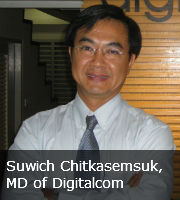 In Thai security, the business culture is such that relationships between local partners and local governments or users are valued most, stressed Suwich Chitkasemsuk, MD of Digitalcom. “Other than the three southern provinces that are experiencing social unrest and are directly monitored (via thousands of cameras) by the central government, solution providers or distributors are advised to foster and build rapport with individual provincial governors, city mayors and managers, police chiefs and local system integrators/installers/resellers. To facilitate proper channel development and communication, the Thai Security Association (TSA) was founded in April, of which we are one of the founding members.” The key mission of the TSA is to bridge all the gaps, through face-to-face events like seminars and road shows, among solution providers, channel partners, large users/buyers and academia.
In Thai security, the business culture is such that relationships between local partners and local governments or users are valued most, stressed Suwich Chitkasemsuk, MD of Digitalcom. “Other than the three southern provinces that are experiencing social unrest and are directly monitored (via thousands of cameras) by the central government, solution providers or distributors are advised to foster and build rapport with individual provincial governors, city mayors and managers, police chiefs and local system integrators/installers/resellers. To facilitate proper channel development and communication, the Thai Security Association (TSA) was founded in April, of which we are one of the founding members.” The key mission of the TSA is to bridge all the gaps, through face-to-face events like seminars and road shows, among solution providers, channel partners, large users/buyers and academia.
Just like doing business in other sizable countries like the U.S., China and India, there is no one company in Thailand that can cover the entire geography alone. Various collaborative or business development models are thus adopted. “As a master distributor of Axis, Milestone and many other brands, we actively work with hundreds of dealers, resellers and integrators throughout the country, to compete in city surveillance, traffic/transportation, border crossing and commercial/enterprise projects,” Chitkasemsuk said.
National Reach, Targeted Approach
Having a national presence is pivotal, especially when many solution providers are moving toward system- and service-based models, Kingchansilp said. “Our four monitoring stations and 10 solid dealers throughout the country put us ahead of our competition (consisting of more than 2,500 security distribution, integration, installation and consultation companies). City surveillance is a national directive, and we, together with our partners, will focus on the increased funding in the north, northeast and south.” 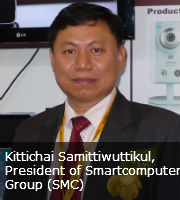
When Smartcomputer started the distribution operation 14 years ago, no one would have thought that the Thai security market would get this big, shared Kittichai Samittiwuttikul, President of Smartcomputer Group (SMC). “Now, we have two separate teams, analog systems and IP solutions, servicing different clients with varied requirements. The IP team was formed three years ago, to cater to increasing market demand and to demystify that network-based security technology was too costly, too difficult to install and configure, and too cumbersome for operators or end users to handle.” IP shipments today account for 15 to 20 percent of SMC's sales revenue, of which government projects make up about 40 percent; it has been a significant rise from less than 10 percent three years ago. 
Another IP-focused distributor agreed. “Over the last two years, growth in the adoption of IP-based security technology has been phenomenal; for example, one of the brands that we represent, Vivotek, has experienced 400-percent local sales growth, particularly in government projects (city surveillance, transportation, buildings), retail and department stores, and manufacturing and commercial sites,” said Sakchai Somsuk, MD of TSolutions. “To properly service and sustain this growth, we have a dedicated system integration team, offering training demos/courses and project design and commissioning support.” Affordable, easy-to-install/use systems and customizations fit for specific vertical markets are also offered.
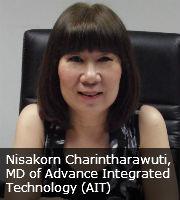 In Thailand, where network infrastructure is shaky in most parts of the country, having an IT/IP background definitely helps. “When Advance Integrated Technology (AIT) was established in 1993, the company started as an IT system integrator, providing customized hardware, software, solutions and services,” said Nisakorn Charintharawuti, MD. “In 1997 as the Asian financial crisis hit, we shifted our focus to digital surveillance, working with Korean and Taiwanese DVR brands. One of the first prominent projects during the transition was a national bank with 600 branches, paving our way and reputation for the next 10 years. In 2009, global recession, fierce competition, low margins and heavy service loading pushed us to do something different. We began to focus on one brand, Mobotix, because of its pure IP approach and durable, reliable products. What Mobotix provides are turnkey solutions, not simple box cameras, so we took the time to educate the integrator and installer community on overall TCO and ROI through road shows.”
In Thailand, where network infrastructure is shaky in most parts of the country, having an IT/IP background definitely helps. “When Advance Integrated Technology (AIT) was established in 1993, the company started as an IT system integrator, providing customized hardware, software, solutions and services,” said Nisakorn Charintharawuti, MD. “In 1997 as the Asian financial crisis hit, we shifted our focus to digital surveillance, working with Korean and Taiwanese DVR brands. One of the first prominent projects during the transition was a national bank with 600 branches, paving our way and reputation for the next 10 years. In 2009, global recession, fierce competition, low margins and heavy service loading pushed us to do something different. We began to focus on one brand, Mobotix, because of its pure IP approach and durable, reliable products. What Mobotix provides are turnkey solutions, not simple box cameras, so we took the time to educate the integrator and installer community on overall TCO and ROI through road shows.”
 As the market matures and competition intensifies, change is in order. “The system integration market in Thailand was already a red sea, so we decided to focus on the distribution business, per agreement with Bosch Security Systems,” said Kritsada Phanbamrung, MD of CCTV Thailand. “In addition to the government, high-end hospitality and industrial sectors, we are beginning to serve mid-end hotels, banks, schools and retail shops with Bosch's new budget line (Advantage), both within greater Bangkok and the surrounding regions/provinces of the city.”
As the market matures and competition intensifies, change is in order. “The system integration market in Thailand was already a red sea, so we decided to focus on the distribution business, per agreement with Bosch Security Systems,” said Kritsada Phanbamrung, MD of CCTV Thailand. “In addition to the government, high-end hospitality and industrial sectors, we are beginning to serve mid-end hotels, banks, schools and retail shops with Bosch's new budget line (Advantage), both within greater Bangkok and the surrounding regions/provinces of the city.”
Another great example of transformation is Bangkok OA Coms. “We started in the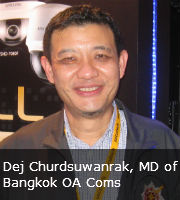 1970s, selling office automation products (hence the company name). About 15 years ago, we began to dabble in physical security, with Samsung Techwin cameras,” said Dej Churdsuwanrak, MD. “It was not easy selling the security surveillance concept and breaking into new market segments, so we approached hotels and condominiums with existing, old equipment (mostly European, American and Japanese brands) that were looking to replace or upgrade. Then came an opportunity for change; the Bank of Thailand issued a mandate requiring all commercial banks to install security cameras and systems. We won two projects, each with about 900 branches nationwide, and became known as a system integration specialist in physical, electronic security. The success stories helped Bangkok OA secure other prominent retail accounts with national presence, and the boost of extra cash flow also allowed the company to extend its reach into neighboring countries Laos, Vietnam and Bangladesh in 2000. Three years ago, another change came as Samsung restructured internally; we transformed from a system integrator to a value-added distributor, by providing even better project support, knowledge transfer and profit-sharing models. We will also be working closely with Vantech from Vietnam, to promote the brand throughout the ASEAN Economic Community (AEC, Thailand and Indonesia first). The partnership can even go beyond security, to other home appliances and electronics.”
1970s, selling office automation products (hence the company name). About 15 years ago, we began to dabble in physical security, with Samsung Techwin cameras,” said Dej Churdsuwanrak, MD. “It was not easy selling the security surveillance concept and breaking into new market segments, so we approached hotels and condominiums with existing, old equipment (mostly European, American and Japanese brands) that were looking to replace or upgrade. Then came an opportunity for change; the Bank of Thailand issued a mandate requiring all commercial banks to install security cameras and systems. We won two projects, each with about 900 branches nationwide, and became known as a system integration specialist in physical, electronic security. The success stories helped Bangkok OA secure other prominent retail accounts with national presence, and the boost of extra cash flow also allowed the company to extend its reach into neighboring countries Laos, Vietnam and Bangladesh in 2000. Three years ago, another change came as Samsung restructured internally; we transformed from a system integrator to a value-added distributor, by providing even better project support, knowledge transfer and profit-sharing models. We will also be working closely with Vantech from Vietnam, to promote the brand throughout the ASEAN Economic Community (AEC, Thailand and Indonesia first). The partnership can even go beyond security, to other home appliances and electronics.”
Multitiered
To cater to a huge market like Thailand, sealing deals requires a multitiered approach, in both partnerships and solution offerings. “The key brands that we represent (such as AVTech, CNB, Dahua and Nuuo) ensure that we have the right solutions at the right price points for each market segment, from small residential to large city surveillance applications,” Samittiwuttikul said. “For example, there are currently more than 3,000 villages nationwide undergoing ‘safe town' projects, with an average financing package (from the central and municipal governments) of $30,000. This is just Phase 1, as Thailand strives to become the center of the AEC by 2015; the ultimate goal is to rid the country of drug problems, starting from schools and town centers, before and after the borders open up. We design various systems that are fit for different budget ranges to help our dealers (more than 600) compete in project bids. It is about having functional, manageable, reasonably priced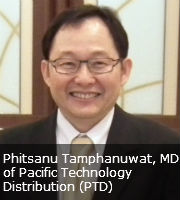 system solutions.”
system solutions.”
While Pacific Technology Distribution (PTD) is a pure distributor, it takes a system-based approach, offering the ammunitions (surveillance, access, intrusion, scans and fire safety, bundled in every way possible) that its integrators (about 100, medium-size) need to build relationships and win projects, said Phitsanu Tamphanuwat, MD. “For the government and financial sectors that we excel at, European, American and Japanese brands, such as Bosch, OnSSI, Panasonic (Sanyo) and UTC, are still preferred. We also have other ongoing industrial (factories and oil/gas), high-end retail and hotel, and residential projects.” Software and services are where Tamphanuwat sees the most growth and where the company will invest more resources in.
A friendly competitor, Digital Focus, agreed on the service approach. “We have been around for more than 10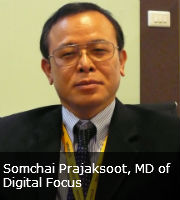 years, and currently partner with more than 150 dealers nationwide,” said Somchai Prajaksoot, MD. “We also work with system integrators on financial, highway and military projects, and with three types of retail outlets (Fortune Town, Digital Gateway and CCTV Outlet) for direct sales. Multiple brands (for example, AVTech, Hikvision and Honeywell) and multiple channel partner types ensure our reach to every segment of the Thai market, as a true total solutions provider.” And being a pure distributor in this market is simply not enough; the company is looking to provide monitoring services through an in-house, ISO9000-certified central station.
years, and currently partner with more than 150 dealers nationwide,” said Somchai Prajaksoot, MD. “We also work with system integrators on financial, highway and military projects, and with three types of retail outlets (Fortune Town, Digital Gateway and CCTV Outlet) for direct sales. Multiple brands (for example, AVTech, Hikvision and Honeywell) and multiple channel partner types ensure our reach to every segment of the Thai market, as a true total solutions provider.” And being a pure distributor in this market is simply not enough; the company is looking to provide monitoring services through an in-house, ISO9000-certified central station.
As an integrated solution and service provider that recently merged with Tyco Thailand, Takachiho focuses on offering everything that its Japanese clients and Tyco's global accounts in the country would need, said Bussakorn Kaewmorakot, Security Business Manager at Takachiho Fire, Security & Services. “We have been around for about 17 years, so we know those needs and the key decision makers well. For the clientele that we serve, individual brands don't matter too much; it's about delivering the right overall solution and getting the best result (from both business and security operations) possible.”
Beyond Boundaries
AEC is a hot topic right now, and Thailand is preparing itself to be the center and propeller of it by 2015. “Two thirds of our revenue comes from system integration work (the rest being distribution) within the region, especially in Thailand, Cambodia, Laos and Myanmar,” Beeber said. “It definitely helps having long-standing, cross-border relationships. For example, Gallagher Group, one of our technology partners, introduced us to a building project in Cambodia, as it has had close ties with one of the decision makers for almost two decades (since his school days); the entire project was worth $150 million, almost the same as another embassy project we had in that country. We are also working closely with a number of multinational mechanical and electrical companies active throughout the region.”
Digitalcom is considering setting up joint ventures in Laos, Cambodia and Myanmar, to help the region advance with appropriate security technology, and is also looking into cloud offerings with the right infrastructure, telecom and camera partners, Chitkasemsuk said.
“Chinese brands have significant penetration rates in AEC, but we believe it's a very high-potential market that can fuel the emergence of local brands like Vantech,” Churdsuwanrak said. “We have the upper hand in local knowledge, connections and credibility. Thailand comes first, but the region is for us to grab and grow.”